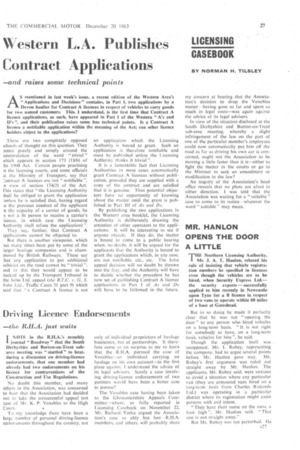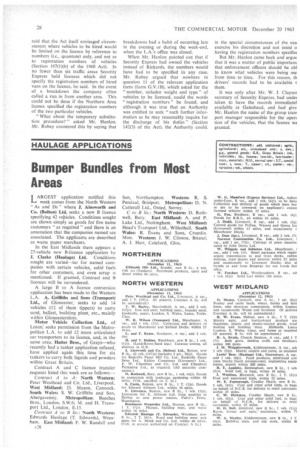MR. 'HANLON OPENS THE DOOR A LITTLE
Page 29

Page 30

If you've noticed an error in this article please click here to report it so we can fix it.
'THE Northern Licensing Authority, I Mr. J. A. T. Hanlon, relaxed his rule of insisting that vehicle registration numbers be specified in licences even though the vehicles are to be hired, when Security Express Ltd.— the security experts — successfully applied to him recently in Newcastle upon Tyne for a • licence in respect of two vans to operate within 60 miles of a base at Gateshead.
But in so doing he made it perfectly clear that he was not" opening the door" to any person who hired vehicles on a long-term basis. "It is not right for somebody to have, on a long-term basis, vehicles for hire", he said.
Though the application itself was unopposed, Mr. I. Robey, representing the company, had to argue several points before Mr. Hanlon gave way. Mr. Robey's first argument was ruled out straight away by Mr. Hanlon. The applicants, Mr. Robey said, were anxious to avoid a situation where any particular van (they are armoured vans hired on a long-term basis from Charles Rickards Ltd.) was operating in a particular district where its registration might assist persons with evil intent.
"They have their name on the vans, a foot high ", Mr. Hanlon said. " That one is out straight away." But Mr. Robcy was not perturbed. He a27 said that the Act itself envisaged circumstances where vehicles to be hired would be limited on the licence by reference to numbers (i.e.. quantum) only, and not as to registration numbers of vehicles (Section 167(I)(b) of the 1960 Act). In no fewer than six traffic areas Security Express held licences which did not specify the registration numbers of hired vans on the licence, he said. In the event of a breakdown the company often called a an in from another area. This could not be done if the Northern Area licence specified the registration numbers of the two particular vehicles.
"What about the temporary substitution procedure?" asked Mr. Hanlon. Mr. Robey countered this by saying that breakdowns had a habit of occurring late in the evening or during the week-end, when the L.A.'s office was closed.
When Mr. Hanlon pointed out that if Security Express had owned the vehicles instead of Rickards, the numbers would have had to be specified in any case, Mr. Robey argued that nowhere in question 11 of the relevant application form (form G.V.I13), which asked for the "number, unladen weight and type" of vehicles to be licensed, could the words "registration numbers" be found, and although it was true that an Authority was entitled to seek "such further information as he may reasonably require for the discharge of his duties (Section 142(3) of the Act), the Authority could,
in the special circumstances of the casi exercise his discretion and not insist o having the registration numbers specific( But Mr. Hanlon came back and argue that it was a matter of public importanc that enforcement officers should be abl to know what vehicles were being use from time to time. For this reason, th drivers' records had to be available t them.
It was only after Mr. W. J. Claysor secretary of Security Express. had uncle] taken to have the records immediatel available at Gateshead, and had give Mr. Hanlon the name of the group tram port manager responsible for the open; tion of the vehicles, that the licence wa granted.




























































































